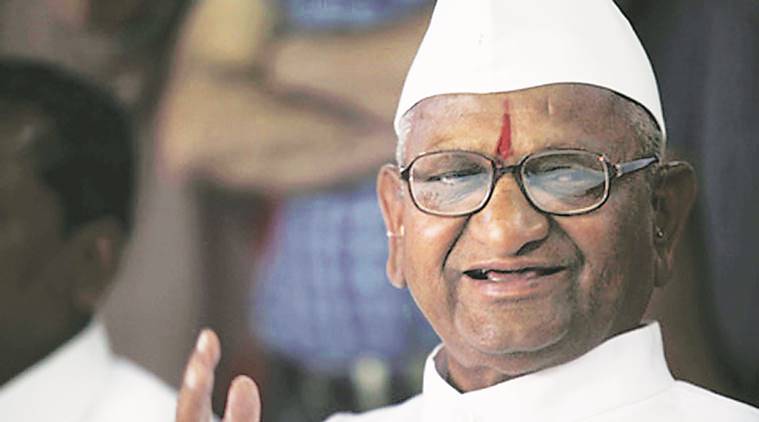- India
- International
Adieu, Lokpal?
The governing elites are in no mood to see a functioning ombudsman that will curb the power of the political executive.
 Social activist Anna Hazare. (File photo)
Social activist Anna Hazare. (File photo)
Harold Wilson, British Prime Minister in the 1960s, had famously observed that a week is a long time in politics. By that reckoning, six years in the politics of a nation would be an eternity. Six years ago, in April 2011, Anna Hazare began a hunger strike to establish a strong Jan Lokpal Bill to fight all-pervasive corruption. Thereafter, for more than two years until the 2013 elections, the India Against Corruption (IAC) movement of Team Anna, riding the wave of popular discontent and anger against the governing class, brought a weak government to its knees and governance to a standstill. A revealing snapshot of those tumultuous months of countrywide protests was the then-finance minister and now our president receiving Baba Ramdev, a Team Anna partisan, at Delhi airport.
Caving in to enormous public pressure, Parliament passed the Lokpal Act in 2013. Four years down the line, this act, perhaps the only one enacted post-Independence due to direct “people power”, stagnates in the statute books, ignored by the civil society that earlier vigorously rooted for its implementation. Significantly, the act, even in its present moribund state, is being whittled down with amendments, such as the one in 2016 which eliminates the earlier statutory requirement for public servants to disclose the assets of their spouses and dependent children, although it is well-known that illegally acquired assets are usually in the names of family members. Similarly, the government’s proposed amendment to the Prevention of Corruption Act (PCA) — which requires the Lokpal to seek government sanction not only for prosecuting public servants but even retired public officials — is clearly designed to weaken the Lokpal.
The political class is understandably wary of an all-powerful ombudsman with no accountability. Even the champion of the Lokpal, the wily Arvind Kejriwal, deliberately conceived of a Jan Lokpal Bill for Delhi, which he knew would never be approved by the Centre. Ironically, the man who had earlier resigned the chief ministership because of the aborted Lokpal Bill has now turned his back on it.
How does one explain the extinguishing of public interest in the lokpal? The singular factor is the prime minister who, post-demonetisation, has assumed the mantle of the nation’s anti-corruption messiah. Deified by a large section of his countrymen, he is perceived as the only hope in the Herculean fight against corruption. So powerful and clean is his public image that Anna Hazare’s recent threat to agitate against the government for not appointing the Lokpal has been contemptuously ignored, as also the Supreme Court’s reprimand over the delay in appointing the Lokpal. No individual or institution today dares to confront the PM on corruption.
A question arises: Why is the PM, who has taken on corruption head-on, averse to setting up the lokpal to assist him in the fight against corruption? The ostensible reason the government has given is that there is no Leader of Opposition for constituting the selection committee for appointing the Lokpal, although the same statutory limitation for the appointment of the CBI director was overcome through a suitable amendment in the law.

In fact, the Supreme Court ruled this week that the Lokpal could be appointed without a Leader of Opposition. It is not
difficult to fathom that the real reason for the government’s reluctance on the Lokpal is on account of its implications for the CBI.
The Lokpal Act has invested the inquiry and prosecution wings of the Lokpal with the powers presently exercised by the CBI, the last thing that the political executive would concede willingly. The CBI today is an outfit with an unmistakeable aura of menace, with everyone in the hierarchy from ministers downward holding the agency in fearful awe. No government would want an investigating agency functioning under an unaccountable entity to monitor not only government servants but also MPs and the top political executive including the PM.
Look at what is happening in Romania: A major upheaval impinging on corruption has, unfortunately, gone under our media’s radar. Countrywide anti-corruption protests in Romania in February this year with about 2.5 lakh protesters coming onto the streets of Bucharest alone, forced the government to withdraw an ordinance designed to weaken Romania’s anti-corruption authority, the DNA.
The ordinance that outraged the nation sought to decriminalise abuse in office by officials if the sums involved were less than $48,500. The ruling party, the PSD, has alleged that the anti-corruption ombudsman, the DNA, is politically biased, indicting more of their officials than of other parties. Significantly, in the first eight months of 2016, the DNA had indicted 777 individuals including judges, parliamentarians and ministers. While the people have applauded the DNA, it has been accused by politicians of being draconian and biased.
What’s happening in Romania has important lessons for India. How does one ensure the impartiality and fairness of a Lokpal armed with a police investigative agency that functions free of political regulation? Will the inherent tensions between the anti-corruption agency, the Lokpal and the government adversely affect governance? Only time will tell, but as matters stand today, these issues are irrelevant as the governing elite are in no mood to see a functioning Lokpal.
EXPRESS OPINION
More Explained
Apr 19: Latest News
- 01
- 02
- 03
- 04
- 05









































